(Contributed - by Bob Morstadt - 09/01/10)
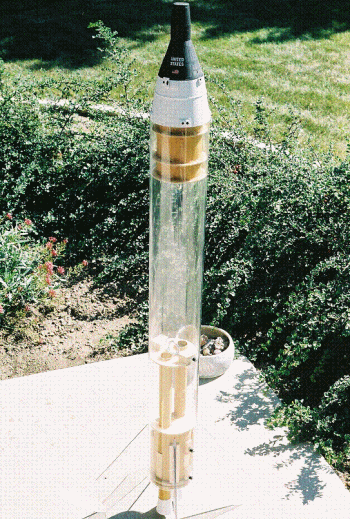 |
|
Figure 1. Overall Construction of the Gemini-Titan |
|
Scratch Built 5-Inch Dia. Gemini-Titan This is a description of a scratch built 5-inch diameter Gemini-Titan based
on a tube from US Plastic Corp, Lima, OH as described in the Sport Rocketry Magazine May/June 2001 issue, "1/24
Scale Gemini-Titan", by Andrew Waddell. The chief advantage of the plastic tube is that no spiral needs to be
filled and the plastic is easy to paint. The capsule is from the Revell kit.
The construction is similar to Andy Waddell's, but I used fins that were scaled up from the Estes model and used
through-the-wall fins. The overall construction can be seen in Figure 1. The forward bulkhead plate has woodblocks
attached by epoxy that in turn are attached to the plastic tube by bolts. Actually, one of the bolts is for a rail
button. The forward bulkhead acts a stuffer tube. In hindsight I would consider having more room for the parachute
compartment. An inner phenolic tube acts as an attach point for the clear plastic fins. Aircraft wood blocks straddle
both sides of each fin in the space between the phenolic and plastic tubes. The slots through the plastic fins were cut
with a coping saw in a long and tedious process. The clear fins are cut from .187" thick polycarbonate from US
Plastics. All the internal contact points for the fins were epoxied and there are no external fillets for the fins. In
principle the rear bulkhead plate can be removed if a fin is ever broken, but in practice a broken fins would be very
difficult to repair. A close-up of the lower model fin assembly is shown Figure 2.
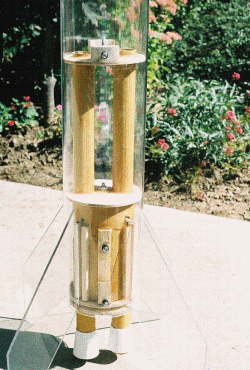 |
|
Figure 2. Close-up of Fin Assembly Construction |
|
Decals were purchased from Tango Papa. The black roll pattern actually came with no white background. I found
some white background with self-adhesive. I painted the rocket first and then put on the white pattern. After this step
I cut the thin white pattern for the clear fins.
After completing the model I weighed the rocket and was surprised to find that it weighed over 9½ pounds
without motors. This was considerably heavier then the RocSim prediction. I modified the RocSim model with the added
point mass option and realized that I would need a larger parachute and more powerful engines. I decided to go with a
10' diameter parachute from Top Flight Recovery. This would give an impact velocity equivalent to dropping the rocket
from a 2-foot height. I decided to go with a cluster of two 29 mm AT H268R's. This is an extra long H-motor that
actually has a forward seal disk and its own extra large end closure. The peak altitude would be about 1600' feet with
both motors firing and about 600' with one motor out. The delay time is similar in both cases. My backyard testing
indicated that a "piston ejection" with about 1.7 grams BP would be sufficient.
I used the Quick Burst Slim Gems along with the Quick Burst Cluster-Buster relay system. I painted the forward
grain of the AT reload with the Quick Burst pyrogen. I attached the igniter leads firmly to each motor and allowed some
slack in the leads so that the igniter leads could follow the model upward in case one motor fired before the other.
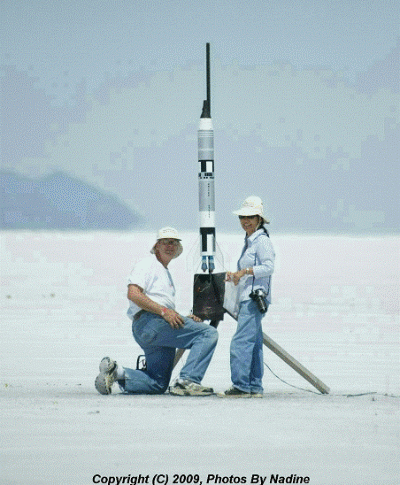 |
|
Figure 3. Gemini-Titan on the Pad at Hellfire-14 sponsored by UROC (photo by Nadine
Kinney) |
|
The rocket is shown on the pad in Figure 3. In Figure 4 the rocket is going up the rail with one motor firing. In
Figure 5 the rocket has cleared the rail with both motors firing. Watching the contrails in the sky I believe I saw a
jog in the flight path as one motor burned out before the other. I forgot to connect the capsule to the parachute quick
link, so the capsule did not survive. The booster landed on the Salt Flats softly enough as to appear to stand for an
instant before toppling over. The booster and fins were intact. The capsule has since been rebuilt and the model is
ready to fly again. I am planning on using CTI motors next time in order to reduce the motor preparation time.
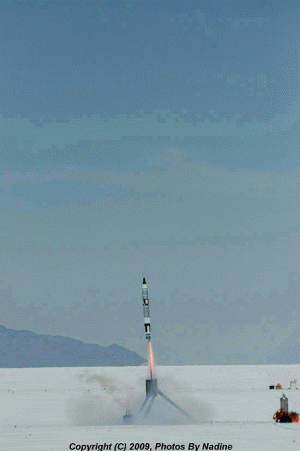 |
|
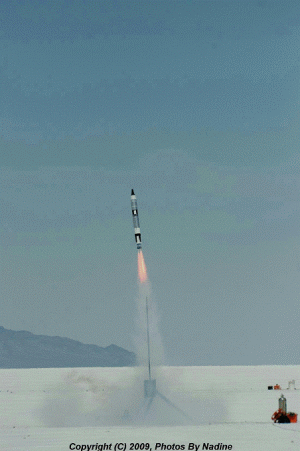 |
|
Figure 4. Gemini-Titan coming off the rail with one motor firing. (photo by Nadine
Kinney) |
|
Figure 5. Gemini-Titan clearing the rail with 2 motors firing (photo by Nadine Kinney)
|
|






